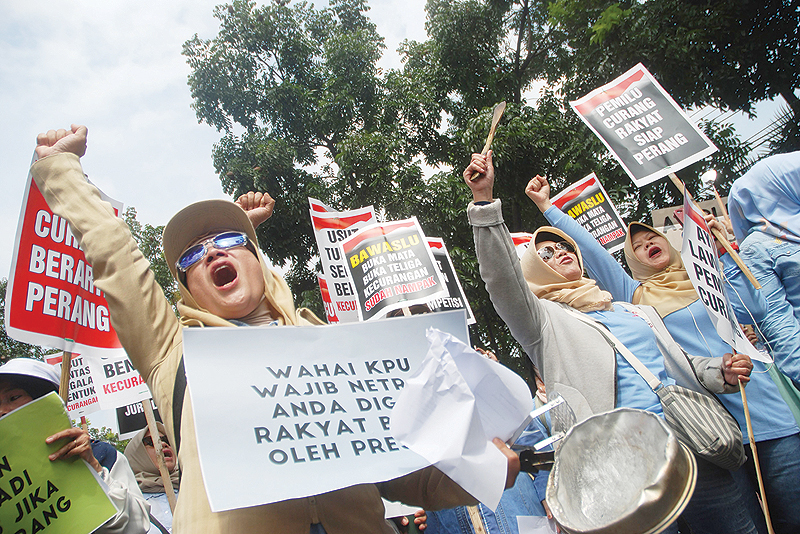JAKARTA: The first online troll I met was a middle-aged, potbellied Indonesian man, dressed casually in jeans and sneakers. He said his nickname was "Commandant". Ahead of Indonesia's elections this month, I and fellow Jakarta correspondent Agustinus Beo Da Costa had spent months trying to get into the world of fake news and propaganda that had flooded social media in the nation of 260 million people. Long before the April 17 vote, it was clear that social media would play a major role in the elections.

With more than 100 million accounts, Indonesia is Facebook's third-largest market and a top-five market globally for its platforms WhatsApp and Instagram, as well as rival Twitter. We had heard that parties and candidates had hired trolls and "buzzer teams" - so called for the online buzz they could create - as campaign tools, and managed to convince Commandant to speak to us after weeks of messaging on WhatsApp via intermediaries. He agreed to an interview, but on condition it was conducted in a hotel room and that we publish no details that would allow him to be identified.
In the end, we settled on renting a private meeting room in a downtown Jakarta residential complex. Initially jittery, Commandant turned effusive when speaking about his team of fifteen "cyber troops" and the dozens of election operations they had run together. He took out three phones and showed us the 250 or so fake accounts he personally maintained across Facebook, Instagram, WhatsApp, Youtube, and Twitter. The members of his teams had around the same amount of fake accounts, he added.
"In one account, I pretend to be a mum so I consistently post pictures and articles about moms, babies, and taking care of newborns' health to make it believable," he said. On a Facebook and Twitter account supposedly of a young woman living in Jakarta that he showed, Commandant had posted almost daily photos of coffees he himself drank across Indonesia. The accounts, which had thousands of followers, were rented out to politicians and brands targeting millenials for their messages, to knock down opponents or defend against criticism, he said.
Commandant maintained that his activities were legal and that he did not spread fake news, but several of the posts he showed Reuters contained clear instances of disinformation. Under Indonesia's broad internet defamation law, creating and spreading fake news is illegal and a jailable offense, but holding social media accounts in false names is not, unless a real person is being impersonated. Social media companies however mostly bar holding accounts under false names.
It's a job
Commandant said he considered his role as handling "communications, personal branding, and crisis management" for politicians and corporations. Da Costa and I later spoke to half a dozen current and former buzzers, typically after 2-3 prior negotiations with intermediaries. They said using their paid-for services had become the new normal in Indonesia. Political parties officially denied hiring buzzers or trolls, but party aides and advisers privately said their use was common, although they consistently denied the use of fake news.
One man who said he worked with buzzer teams supporting opposition candidate Prabowo Subianto was the most nervous. When we met him in the far corner of a downtown Jakarta restaurant, he constantly looked around to make sure no one could hear us. He argued he did not write fake news, although we later found false stories online that carried his byline. "We're in a war for content… Why would anyone admit to writing fake news to you?" he said. "They'd go to jail for 2 years. Especially people like me who are working for the opposition."
The final element in a successful "buzzer" campaign is the use of bots and spam accounts, which buzzers and social media consultants said were mostly used on Twitter and Instagram to create trending topics. Kanishk Karan, at the Digital Forensic Research Lab in Washington, said he found that in the month before the Indonesian elections, a quarter of the tweets posted for some prominent hashtags supporting President Joko Widodo were from bots, using automated applications.
While Indonesia's presidential election result still needs to be officially confirmed, sample vote counts by private pollsters indicate Widodo is headed for a second term in office. The results of the vote are being disputed by his challenger Subianto, which means "buzzer" teams have stayed active beyond the voting nearly two weeks ago. Reuters reporters have received nearly a dozen videos allegedly showing fraud at polling stations, with several since disproved by fact-checkers. - Reuters









